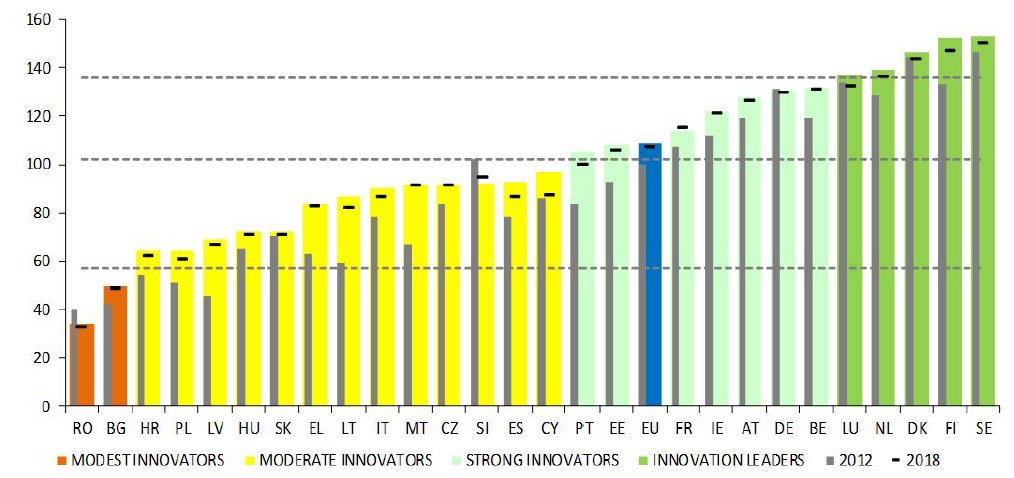Luxembourg demonstrates a steady performance over the years in terms of innovation, according to the Innovation Scoreboard published annually by the European Commission. Positioned in 2018 as one of the innovation leaders, the country moved to the second group, “strong innovators”, in 2019, while still improving its general performance.
In the 2020 edition of the scoreboard, Luxembourg is back among the innovation champions, alongside the untouchable Scandinavian trio – Sweden, Finland and Denmark – and the Netherlands. “’Attractive research systems’, ‘Employment impacts’ and ‘Human resources’ are Luxembourg’s strongest innovation dimensions,” says the report. “The strong increase in 2019 is mainly due to improved performance in doctorate graduates and broadband penetration.”

For the first indicator, the relative performance index compared to the European Union (base = 100) went from 32.4 in 2012 to 94.7 in 2019. For the second, it jumped from 130 to 340 over the same period.
International cooperation
“For the third consecutive year, Luxembourg ranks first among the most attractive research systems. This underlines the considerable development of our young research and innovation ecosystem, and is a significant recognition of the country’s continuous efforts to develop a world-class R&D and innovation landscape,” says Marc Schiltz, Secretary General of the Luxembourg National Research Fund (FNR). Dr Schiltz is also president of Science Europe, an association of research institutes and research funders.
Even if it is small, Luxembourg’s national research landscape proves its quality and has now even more convincing arguments
The vast network of international collaborations set up in recent years further strengthens this evaluation of excellence. One-fourth of the projects funded by the FNR between 2014 and 2019 are international projects. The FNR has signed 18 bilateral collaboration agreements and is a partner of more than 12 international research networks offering multilateral research opportunities with more than 35 countries for Luxembourg-based researchers.
“Even if it is small, Luxembourg’s national research landscape proves its quality and has now even more convincing arguments,” notes Mr Schiltz. “This is evidenced by the high level of synergies and collaborations between the research institutions, shown notably by the COVID-19 Task Force of Research Luxembourg.”
The Research Luxembourg initiative symbolises the synergies of the national ecosystem. Stemming from the cooperation between the country’s main public research organisations (the Luxembourg Institute of Health, the Luxembourg Institute of Socio-Economic Research, the Luxembourg Institute of Science and Technology, the University of Luxembourg and the FNR, and supported by the Ministry for Higher Education and Research), the initiative aims at promoting scientific cooperation in Luxembourg and communicating on the activities of the sector as a whole. Its intensive work during the COVID-19 crisis demonstrated the effectiveness of the approach.
Tailor-made tools
Although research is one of the strong pillars of Luxembourg’s innovation strategy, it is obviously not the only one. The report also highlights an innovation-friendly environment, supported both by a top-notch technological infrastructure and by a spirit of opportunity-driven entrepreneurship (with a relative score of 122.2 compared to the European average of 100).
“Luxembourg’s general performance demonstrates to our neighbouring countries and to the other members of the European Union that we are capable of offering one of the best ecosystems and that the Grand Duchy is an attractive place for research and innovation,” analyses Sasha Baillie, CEO of the national innovation agency Luxinnovation. “This will also help us to better target the challenges that we will have to face. Therefore, we must ensure that we offer innovation programmes that are in line with the opportunities that are available for our businesses.”
Luxembourg’s general performance demonstrates that we are capable of offering one of the best ecosystems and that the Grand Duchy is an attractive place for research and innovation.
In addition to a range of financial aid measures offered by the Ministry of the Economy for companies, Luxinnovation manages a series of “Fit 4” performance and innovation programmes. These programmes have been set up in response to the expectations and needs of businesses, and are a good way for companies to find both development and funding solutions for the future.
“In addition to this, the data-driven innovation strategy published last year by the Ministry offers strong guidance,” says Ms Baillie. “The government is investing in digital infrastructure, and Luxinnovation, together with its partners, is able to offer various services allowing companies to tackle their digital transformation – an essential point that they need to address.”
Photo: Bohumil Kostohryz

